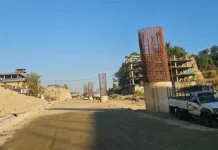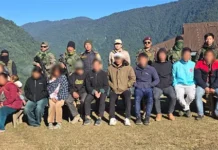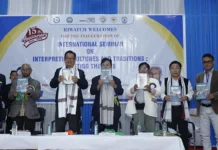NEW DELHI, Apr 3: The Supreme Court on Tuesday said it will consider in detail the Centre’s review petition against its March 20 judgement on the SC/ST Act but declined to keep in abeyance the directions passed by it to deal with the issues of arrest and sanction under the special law.
The apex court said people who are agitating may not have read the judgment properly and must have been misled by people with vested interests.
Several states were rocked by violence and clashes yesterday following a ‘Bharat Bandh’ call given by several SC/ST organisations protesting the top court’s March 20 order that has claimed eight lives.
“We have not diluted any provision of SC/ST Act but only safeguarded the interests of the innocents from being arrested,” a bench comprising Justices A K Goel and U U Lalit asserted. It was the same bench that had passed the 20 March judgment.
During an hour-long hearing, the apex court said the provisions of the SC/ST Act cannot be used to terrorize the innocents.
The bench made it clear that it would hear the Centre’s plea for a review of the earlier judgment, along with those who were original parties in the main petition, including the Maharashtra government.
The apex court has listed the Centre’s review petition after 10 days for detailed hearing and asked the Maharashtra government and others to file written submissions within two days.
During the hearing, the bench also said the law which has come under scrutiny does not mandate immediate arrest on filing of a complaint as the Act in question is a substantive law and, in the judgement, it has clearly sought its implementation in accordance with the procedural law as given in the CrPC.
The bench also clarified that there was no dilution of any provision of the SC/ST Act or Rules and said compensation can be paid to the alleged victims of atrocities even prior to the registration of FIR under SC/ST Act.
The bench said the only offences mentioned in the SC/ST Act were the subject matter of the judgment and other cognizable offences under IPC would not require inquiry before registration of FIR.
The apex court also said in the direction that it has only given the outer limit of seven days for completing the inquiry for the offences registered under the SC/ST Act.
Earlier in the day, the apex court had agreed to hear the review petition after Attorney General KK Venugopal sought urgent hearing of the review petition today itself and referred to the large scale violence and loss of lives and property during yesterday’s Bharat Bandh.
A bench headed by Chief Justice Dipak Misra agreed to constitute the original bench of Justices A K Goel and U U Lalit at 2 pm to hear the review plea.
In its review petition, the union government said the March 20 verdict has “wide ramification and implication resulting in dilution of the stringent provisions of law enacted under the 1989 enactment. It adversely affects a substantial portion of the population of Indiabeing the members of SC/ST. It is also contrary to the legislative policy of Parliament as reflected in the Prevention of Atrocities Act 1989”.
On march 20, the apex court had that “in view of the acknowledged abuse of law of arrestin cases under the Atrocities Act, arrest of a public servant can only be after approval of the appointing authority and of a non-public servant after approval by the Senior Superintendent of Police (SSP) which may be granted in appropriate cases if considered necessary for reasons recorded.”
It had also directed that the reasons recorded by the competent authority and the SSP must be scrutinised by the magistrate for permitting further detention of an accused.
To avoid false implication of an innocent, the top court had also directed that a preliminary enquiry may be conducted by a DSP rank officer to find whether the allegations make out a case under the Atrocities Act and are not frivolous or motivated. (PTI)




